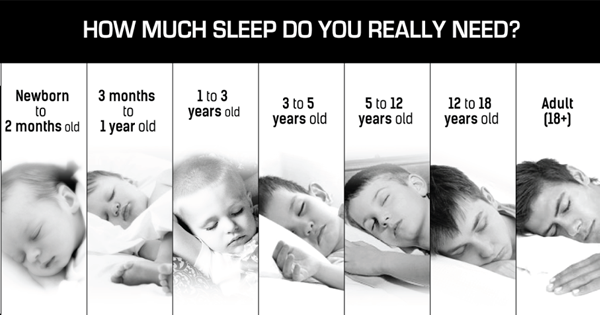For years, we’ve been told that 8 is always the magic number when it comes to sleep; if you get eight hours of sleep every single night, then you’re golden.
Recently, however, researchers have pretty much busted that myth in one way or another. Maybe 8 isn’t all that great after all?
One of the most important discoveries in terms of sleep is probably that quality holds more weight than quantity.
Even if you get eight hours of sleep every night, you may still wake up feeling groggy, sluggish, and tired if two of those hours were spent tossing and turning.
While sleep quality is definitely a personal experience—exercise, health problems, and overall lifestyle choices all impact the way we sleep—the National Institute of Sleep has come up with some pretty handy guidelines.
According to the National Institute of Sleep, here’s how much sleep you need every night, depending on your age:
- Newborns (0-3 months): Anywhere between 14 and 17 hours each night.
- Infants (4-11 months): 12 to 15 hours.
- Toddlers (1-2 years): 11 to 14 hours.
- Preschool (3-5 years): 10 to 13 hours each night.
- Adolescent (6-12 years): About 9 to 11 hours every night.
- Teen (13-17 years): 8 to 10 hours—but it’s important for teens not to skimp on sleep during the week and binge on weekends.
- Young Adults (18-25 years): 7 to 9 hours each night should be enough.
- Adults (26-64 years): Still 7 to 9 hours.
- Seniors (65+): Older adults only need about 7 to 8 hours of sleep each night.
Signs you may not be getting enough (good) sleep each night:
- You’re feeling sluggish or fatigued in the morning.
- You have headaches when you wake up.
- You’ve been gaining weight lately.
- You feel noticeably less productive at work.
- You’re too tired to exercise.
- You constantly need caffeine to make it through the day.
Tips for a better night’s sleep:
- Stick to a strict schedule (even on weekends!)
- Exercise every day, preferably in the morning.
- Stop consuming caffeine after 3 p.m.
- Take a hot shower before bed.
- Turn off all electronic devices (phone, laptop, TV) at least 1 hour before bed.
Photo courtesy: positivemed.com





